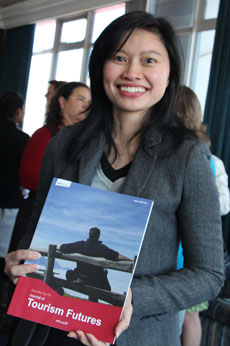How does research shape the future of tourism?

30 leaders, students and academics gathered at Victoria University of Wellington for the launch of Journal of Tourism Futures, a new initiative led by Dr Ian Yeoman and the European Tourism Futures Institute (www.etfi.eu) that explores how the future is created and what the future could be.
Introducing three speakers, Chris Roberts, Chief Executive of the TIA noted the value and importance of rigorous research in creating the future.
Simon Wallace, TIA Policy and Research Manager stated “that insight rather than research is the foundation of the Tourism 2025 framework that aims to grow industry earnings to $41 billion a year by 2025. The framework places a strong emphasis on the use of insight with TIA focused on driving a culture change in the industry that values the importance of insight to inform business decision-making”.
The future is like history, as history is an explanation of changes that have occurred whereas the future is about understanding how that change might occur. Dr Ian Yeoman observed “we cannot determine an exact future only picture a series of alternative futures in which to act out and prepare for. Change is slow and rapid. Demography and ageing populations are certain and slow whereas technology is of a scary pace”.
Victoria University Senior Lecturer, Dr Christian Schott focused on the pivotal role of teaching and learning in shaping the future of tourism, “we need mindful, critical and creative thinking about tourism higher education and how key trends, such as socio-economic, political and environmental changes, will impact on society. As educators, we need to encourage and support the development of broad skill sets that allow students to shape the future rather than be passive participants in a future defined by others.”
The Journal of Tourism Futures sets out to facilitate a journey of understanding and debate through scholarly articles about the future and how to make sense of the future through a variety of methods and tools. It is hoped that the Journal of Tourism Futures will be the written forum and first point of reference for argument, dispute, controversy, ideas, direction, research and discussion. The goal of this initiative is to bring academic rigour to the study of the future of tourism. For further details see www.etfi.eu/jtf
